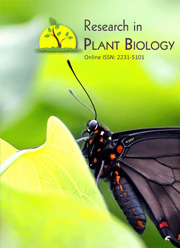Polyethylene glycol mediated protoplast fusion of medicinally important Canna
Keywords:
Canna, protoplast, Cellulase, Pectinase, PEGAbstract
Canna is a spetacular ornamental plant which gains its importance in terms of nutritive and medicinal values. However, there are number of problems related to the production and breeding for improved varieties of Canna. Protoplast fusion technique was tried to generate genetically modified hybrid varieties of Canna. In vitro generated leaves and shoots of Canna indica and Canna edulis were used as the source for isolation of protoplasts. Viable protoplasts (viability range 60-75%) were generated in enzymatic combination of cellulase (1%) and pectinase (0.5%) with an incubation temperature of 24±3ºC for 16-18 hrs in dark. In the present experiment, protoplast fusion in Canna was standardized using Polyethylene glycol (PEG). The fused protoplasts were cultured in a medium consisted of Banana Micropropagation medium, supplemented with nutrients and growth regulators for regeneration.



 .
. 